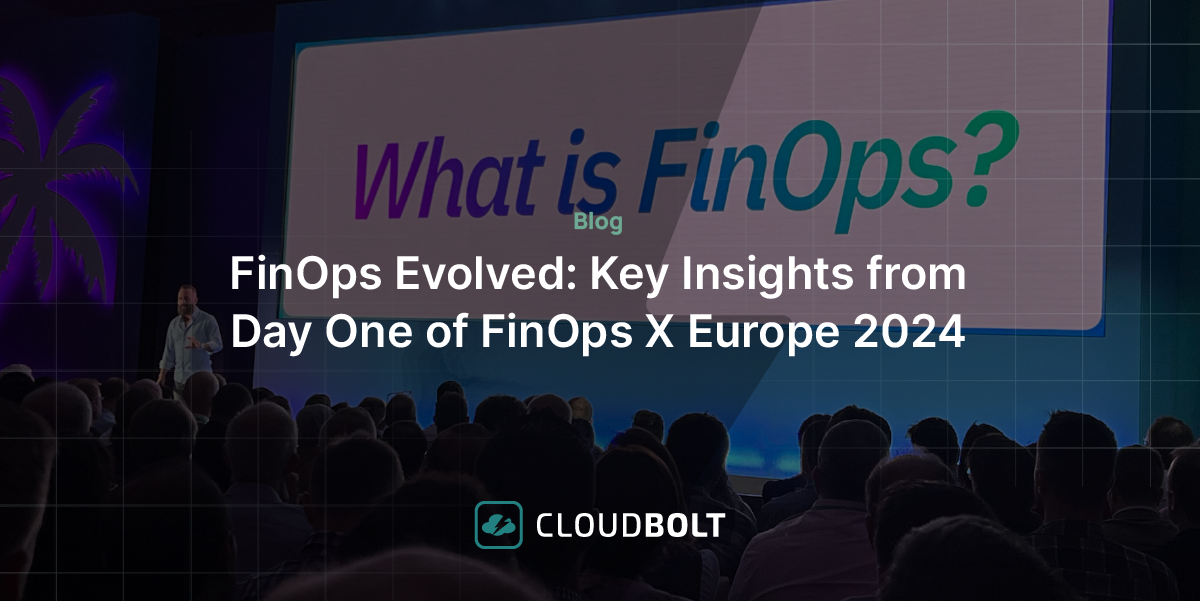Is Your FinOps Practice Ready for AI? Here’s How to Find Out
As a FinOps leader, you’re likely seeing the mad dash toward AI across industries—from automating workflows to cutting operational costs, AI is being pursued at full throttle. But while AI’s potential is undeniable, diving in without a readiness strategy can lead to costly missteps and missed opportunities.
In fact, a recent McKinsey survey found that only about 10% of companies realized significant returns on their AI investments in 2024, underscoring the importance of a thoughtful approach. That’s why we created the Ready to Run: A Guide to Assessing AI Readiness for FinOps ebook—to help your FinOps team set the stage for meaningful, lasting impact. This comprehensive resource provides actionable insights, assessment tools, and a structured framework for building a clear, strategic roadmap to AI success.
Building a Foundation: The Three Readiness Categories for AI
To achieve successful AI adoption in FinOps, it’s crucial to first assess your FinOps practice’s readiness across three readiness categories: Value, Data, and Operational Readiness. We get into much more detail in our Ready to Run ebook, but here’s an overview of each category as well as some sample questions (the full assessment framework is available for download):
Value Readiness: AI investments must align closely with your strategic goals. This means clearly defining the purpose behind your AI initiatives and identifying the specific areas where AI can create measurable impact. Teams that establish this “why” are far more likely to see meaningful returns on their investment.
Sample questions:
- Have we clearly defined the problems AI will solve and their potential impact on our business?
- Are there specific outcomes or KPIs we aim to achieve with AI in FinOps?
- Does AI offer advantages over simpler, non-AI solutions for our current challenges?
Data Readiness: AI is only as effective as the data fueling it. High-quality, accessible, and consistent data is essential for producing reliable insights and predictions. Assessing your data’s readiness is a key step toward ensuring your AI initiatives can operate smoothly and produce actionable outcomes.
Sample Questions:
- Do we have access to all necessary data sources, and are they consistent and reliable?
- Is our data clean, organized, and normalized across sources?
- Do we have sufficient historical data to train AI models effectively and generate meaningful insights?
Operational Readiness: Even the best AI models need a supportive operational environment. This includes having the right team skill sets, infrastructure, and processes in place to manage AI effectively. Operational readiness equips your FinOps team to scale and sustain AI-driven practices over time.
Sample Questions:
- Does our team have the AI/ML expertise required to oversee these initiatives?
- Are our technical environments, like development and testing, ready to support AI workloads?
- Do we have a clear plan for maintenance, support, and training to ensure long-term success?
Ready to Run: A Guide to Assessing AI Readiness for FinOps
Get the ebook

What Comes After Your AI Readiness Assessment?
Once you’ve completed a full AI readiness assessment, you’ll have a clear picture of where your FinOps team stands. So, what’s next? Well, there are a few options you can take, depending on your results.
If your team is fully ready: Congratulations—your team has a solid foundation for AI adoption! This means you have every confidence to present your business case to stakeholders in the organization.
If you identify gaps in readiness: You may feel overwhelmed by what you’re missing, but rest assured, there are still ways to move forward with what you have. Depending on the gaps, consider the following steps:
- For Value gaps: Revisit your AI goals and clarify the specific problems AI will address within FinOps. Consider engaging stakeholders to ensure alignment with organizational priorities and define success metrics that justify the investment.
- For Data gaps: Focus on enhancing data quality, consistency, and accessibility. This could mean normalizing data across platforms or implementing data governance practices to support reliable insights.
- For Operational gaps: Invest in skills development or consider building a dedicated AI team or Center of Excellence (CoE) to centralize expertise and best practices. Preparing your operational environment now will pay off as AI initiatives scale.
There’s also one more thing you can do to overcome your technical hurdles:
- Partner with third-party vendors: Instead of tackling every issue individually, consider working with a vendor that has already developed AI solutions tailored to FinOps needs. Partnering with experienced providers allows you to skip the line, significantly decreasing time-to-value and gaining immediate access to best-in-class expertise. This approach can accelerate scalability and ensure that your team can focus on strategic goals rather than technical hurdles.
Your Path to AI-Driven FinOps Success
Assessing AI readiness is a crucial first step for any FinOps team aiming to unlock the potential of more intelligent, data-driven operations.
Whether it’s aligning AI with strategic goals, preparing data for reliable insights, or building a supportive operational environment, setting up these foundations can make all the difference.
If you’re ready to make AI a cornerstone of your cloud management strategy, our Ready to Run: A Guide to Assessing AI Readiness for FinOps ebook provides a complete framework to assess readiness, make informed decisions, and set your team up for AI success.
Download the Ready to Run ebook today and start your FinOps AI journey with confidence!
Related Blogs

FinOps Evolved: Key Insights from Day One of FinOps X Europe 2024
The FinOps Foundation’s flagship conference has kicked off in Europe, and it’s set to be a remarkable event. Attendees familiar…

